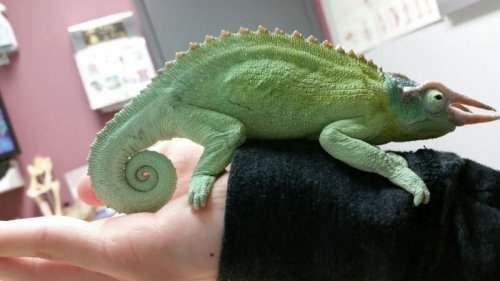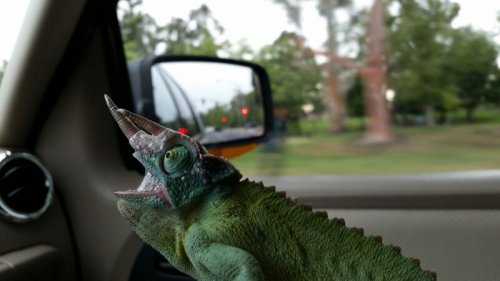SilverWolf
Member
For those of you who did not see the previous post, I was concerned with my Jackson Chameleon, Tricky; He had been sleeping often during the day, and then stopped eating. He still has not eaten for a week, and last he did eat, that was his first and only cricket for that day, without eating for the two days prior. So, Tricky has gone almost ten days eating only one cricket.
Other than sleeping during the day, there was no other concern. He had no other bad signs, his limbs were fine, colours were right, behaviour was fine, ultimately he seemed perfectly healthy. Now my thought, honestly, was an impaction. Still could not be totally sure so I decided to hake him to the veterinarian today, and sure enough that was the diagnosis.
This was both my first vet visit, as well as, Tricky's. The way she handled him was nerve racking to me. The way she felt of his sides and stomach to see if he had "a full stomach" was also rather concerning to me, as he obviously didn't enjoy it, squirming around. She also could just not get him to open his mouth. I was also nervous because he had some dead skin on his neck and head that he never seemed to get off but I never bothered to remove them myself because I had read that's rarely ever a good idea. She did though, but he didn't seem in pain and he looks a bit nice now. There's still some around his horns, and one on his back that have been there for months. Interestingly after be handled so rough he was breathing rather hard when he came back on my hand when she left again for a moment, but did not have any stress colours at all. There was just one dark line on his side but I am not so sure that's even there anymore. I will include that in the photographs. And I had thought just putting him in the container to check his weight was rather harsh
She said she felt it mostly "in the back" and that she would give him an injection to get some fluid in his system, to break up the contents of his stomach. When she came back from giving him his medicine (I did not see her do it) he had his eyes closed and seemed...fuller. The area around his mouth was wet and there was a black spot under his chin. he did open his eyes, then would close them, then open and gape, exhaling hard, then close. He would gape and exhale occasionally on the way home as well. Putting him back in his enclosure was more difficult than I thought, he just seemed to week and walked in with his eyes closed a bit (I sort of had to help his footing). Then he climbed up to the top, and slept. I will show you some pictures of how he looked after the vet visit.
Before that though, I wanted to ask about giving him his Lactulose. She said to give him 0.05 twice a day. It's a little squirty thingy. She said it would take two people to give it to him, one to restrain him and the other to supply it. She also said I would have to lightly pinch under his chin to get him to open his mouth. She said to stop doing it if he gets too stressed, that I should just try my best and in the next couple of days he should defecate.
I think I can give him his medicine without forcing his mouth open though. He opens his mouth to let me squirt water in his mouth, or sometimes just licks the water as the drops come out of the nozzle. I think I can put the medicine in his mouth while he is drinking water then, but what do you think?
Other than sleeping during the day, there was no other concern. He had no other bad signs, his limbs were fine, colours were right, behaviour was fine, ultimately he seemed perfectly healthy. Now my thought, honestly, was an impaction. Still could not be totally sure so I decided to hake him to the veterinarian today, and sure enough that was the diagnosis.
This was both my first vet visit, as well as, Tricky's. The way she handled him was nerve racking to me. The way she felt of his sides and stomach to see if he had "a full stomach" was also rather concerning to me, as he obviously didn't enjoy it, squirming around. She also could just not get him to open his mouth. I was also nervous because he had some dead skin on his neck and head that he never seemed to get off but I never bothered to remove them myself because I had read that's rarely ever a good idea. She did though, but he didn't seem in pain and he looks a bit nice now. There's still some around his horns, and one on his back that have been there for months. Interestingly after be handled so rough he was breathing rather hard when he came back on my hand when she left again for a moment, but did not have any stress colours at all. There was just one dark line on his side but I am not so sure that's even there anymore. I will include that in the photographs. And I had thought just putting him in the container to check his weight was rather harsh
She said she felt it mostly "in the back" and that she would give him an injection to get some fluid in his system, to break up the contents of his stomach. When she came back from giving him his medicine (I did not see her do it) he had his eyes closed and seemed...fuller. The area around his mouth was wet and there was a black spot under his chin. he did open his eyes, then would close them, then open and gape, exhaling hard, then close. He would gape and exhale occasionally on the way home as well. Putting him back in his enclosure was more difficult than I thought, he just seemed to week and walked in with his eyes closed a bit (I sort of had to help his footing). Then he climbed up to the top, and slept. I will show you some pictures of how he looked after the vet visit.
Before that though, I wanted to ask about giving him his Lactulose. She said to give him 0.05 twice a day. It's a little squirty thingy. She said it would take two people to give it to him, one to restrain him and the other to supply it. She also said I would have to lightly pinch under his chin to get him to open his mouth. She said to stop doing it if he gets too stressed, that I should just try my best and in the next couple of days he should defecate.
I think I can give him his medicine without forcing his mouth open though. He opens his mouth to let me squirt water in his mouth, or sometimes just licks the water as the drops come out of the nozzle. I think I can put the medicine in his mouth while he is drinking water then, but what do you think?







